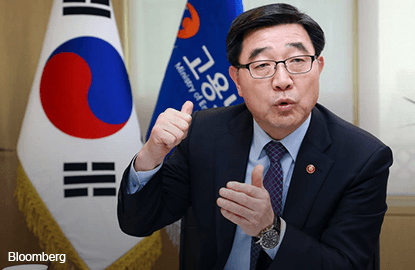
SEOUL (Aug 28): South Korea will enter "an ice age in employment" if it fails to make its job market more flexible as a looming rise in the retirement age threatens to crimp entry-level hiring.
Employment and Labor Minister Lee Ki-kweon criticised both unions and management in the country's major industries for "self-centred decisions" perpetuating a system that's created large gaps in earnings and job security among Korean workers.
"We will enter into an ice age in employment that nobody has ever experienced if we fail to do something now," Lee told Reuters in an interview on Thursday, adding that Korea must create 400,000 more new jobs than usual for young people in the next two or three years.
Early this month, President Park Geun-hye called for "major surgery" on Asia's fourth-largest economy, citing labour practices as a key area in need of sweeping reforms to achieve more sustainable growth.
However, unions are resisting the government's recent push for companies to adopt a "peak wage" system, under which employees take a pay cut as they approach retirement in exchange for prolonging their careers.
The government wants major companies to adopt the system and shorter work hours to avert a plunge in new employment for the next few years as the retirement age rises to 60 next year, from an average of 58 now. That is expected to keep some 300,000 ageing workers on payrolls, exacerbating youth unemployment that hit a 16-year high above 11% in February, although it has eased somewhat.
Auto giant Hyundai Motor Group has said it will adopt the peak wage system from next year and many companies are taking similar steps, but workers at Kumho Tire Co have been on strike for 10 days over the company's push to adopt it.
Nearly one-quarter of full-time employees in South Korea earn less than two-thirds the median wage, the largest percentage in the Organisation for Economic Cooperation and Development (OECD) grouping of developed economies.
In South Korea, only about 10% of 18 million eligible workers are unionised, mostly at large companies, but unions are a powerful force in driving employment practices that reward seniority and ensure job security for those in coveted permanent positions at major companies.
"They need some more courage to represent all workers," Lee said, referring to unions, noting that the wage gap between the top and bottom 10% of workers is 4.7 times, third-highest in the OECD.